Diplomacy on Four Paws
Ralitsa Kovacheva, November 23, 2010
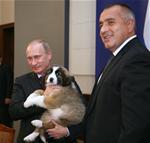 The Minister of Energy Traycho Traykov was not right, saying that the big news from the Borissov-Putin meeting on November 13th was the South Stream project. In fact, the puppy named Yorgo, which Bulgarian PM Borissov gave to Putin, was central in the headlines and in the most broadcast television footages.
The Minister of Energy Traycho Traykov was not right, saying that the big news from the Borissov-Putin meeting on November 13th was the South Stream project. In fact, the puppy named Yorgo, which Bulgarian PM Borissov gave to Putin, was central in the headlines and in the most broadcast television footages.
Even the BBC wrote an ironic title to its report on the issue - “Bulgarian puppy seals gas deal with Russian PM Putin”. The Brussels-based online media EurActiv used the term "puppy diplomacy", recalling that this was not the first time when Borissov had given other heads of state and government dogs of the same breed from his own breeding centre as a present. As the Bulgarian newspaper Trud wrote this summer, in that breeding centre there is a specially trained dog, which would be given as a gift to US President Barack Obama.
But undoubtedly, the most colourful was Andrey Kolesnikov, a journalist with the Russian business newspaper Kommersant, who had no mercy for the Bulgarian national pride in his reports. Thanks to his skills, well forgotten by Bulgarian journalists - to narrate and describe what he sees and feels, Kolesnikov presents a very interesting psychological picture of the official Bulgarian-Russian relations. It was not accidentally that exactly his reports caused quite controversial reactions in Bulgaria – accusations of Russian imperial chauvinism, fawning on Prime Minister Putin and an insult to Bulgaria.
The truth is that the sense of superiority is being felt in every line in his article. It is true that, while reading the article, one is really feeling offended - by the obvious propaganda of the official Russian line, as well as by the fact that Bulgarian politicians really give grounds for such ironic remarks in Russian media. Because it is also truth that many of the details, described by Kolesnikov, we've seen with our own eyes, and many of his comments we have heard repeatedly "informally".
Here is how the journalist describes the first meeting between Boyko Borissov and 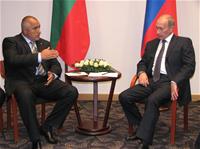 Vladimir Putin in September 2009 in Gdansk. Putin is ready and is awaiting his Bulgarian counterpart: “But [Borissov] wasn’t coming. The protocol in such cases is a tough thing. If one of the negotiators is already standing and waiting for the other, it means that he is ready and the expectation cannot take more than a few seconds. But Boyko Borissov wasn’t coming. Finally I saw that he was approaching Vladimir Putin. Only the opened door was separating them. Vladimir Putin has already made a step toward his colleague … But he [Borissov] suddenly saw an acquaintance down the road, forgot about the Russian Prime Minister and threw himself to hug this man.”
Vladimir Putin in September 2009 in Gdansk. Putin is ready and is awaiting his Bulgarian counterpart: “But [Borissov] wasn’t coming. The protocol in such cases is a tough thing. If one of the negotiators is already standing and waiting for the other, it means that he is ready and the expectation cannot take more than a few seconds. But Boyko Borissov wasn’t coming. Finally I saw that he was approaching Vladimir Putin. Only the opened door was separating them. Vladimir Putin has already made a step toward his colleague … But he [Borissov] suddenly saw an acquaintance down the road, forgot about the Russian Prime Minister and threw himself to hug this man.”
A year later, the action is transferred to Sofia. Here is how the same journalist describes the joint press conference of Putin and Borissov: "The Bulgarian Prime Minister was hanging over the table as a boxing trainer, moreover - sitting almost halfway back to Vladimir Putin and watching vigilantly away, so, on the one hand it seemed as if what was happening was not particularly interesting for him and, on the other - he unintentionally made one remember his past as a VIP bodyguard.”
On the occasion of Borissov's words, concerning Burgas-Alexandroupolis oil pipeline, that according to the population and experts the pipeline will disturb the ecological balance, Kolesnikov commented: “It is worth one to know the Soviet past of Bulgaria and Boyko Borissov's himself, because only in this past it was profitable to refer to the views of the workers”. It is hard to argue that the phrase “the people want this” is often used by the Prime Minister.
Kolesnikov was wrong, however, mentioning that the question about the Third energy package was asked by a Bulgarian journalist. The question was raised by the Russian news agency Interfax and was a good occasion for Putin to criticise EU's legislation. Unfortunately, the Russian journalist had also noticed that "even Boyko Borissov agreed with this”. The fact is that PM Borissov not only didn't defend EU's legislation and position, but he even advised the European Commission to take Putin's statements into account. Whether it was possible at all, it became clear only a day later: the European Commission announced that the Intergovernmental agreement on South Stream, signed between Bulgaria and Russia in 2008 , was against EU's legislation.
"For him [Borissov] the most important was, it seems, to convince the public, not only the Bulgarian but also the European one too, that he is an independent politician. And somehow the more thoroughly he was convincing ... the less I believed”, Kolesnikov wrote.
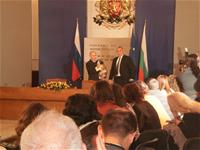 He literally shoots the reader with the finale, where he describes how Borissov is giving the puppy to Putin: “Vladimir Putin took the sheepdog in his hands. The Bulgarian Prime Minister finally turned to face him. And only now I paid attention how alike they were. The Bulgarian sheepdog and the Bulgarian Prime Minister, I mean.”
He literally shoots the reader with the finale, where he describes how Borissov is giving the puppy to Putin: “Vladimir Putin took the sheepdog in his hands. The Bulgarian Prime Minister finally turned to face him. And only now I paid attention how alike they were. The Bulgarian sheepdog and the Bulgarian Prime Minister, I mean.”
The title of the article is also linked to the puppy - it says that Bulgaria joined the South Stream, but the journalist used the word “prisobachili”- a colloquial word, which means to add or to join, but it originates from the Russian word for dog - “sobaka” and makes a clear allusion to an obedient puppy behaviour.
In the same spirit, Asya Emelyanova with the state television channel "Russia 24", in her report from Sofia, said that “to its full, but so far no unconditional surrender to the South Stream, Bulgaria was going for three years.” ”There is nothing wrong with that, along with the NATO “umbrella” and the EU “pillow”, [Bulgaria] to wrap itself up with the good old Russian scarf”, Emelyanova said, because “as the last two years showed, the political decision to include Bulgaria in the Western orbit did not mean that the economy and mentality would become Western.”
What happened on Saturday [November 13] was completely logical, the journalist commented, given the centuries of Bulgarian-Russian friendship: ”How could it be otherwise in a country where the main boulevard is called “Tsar Liberator” in honour of Emperor Alexander II, who has liberated Bulgaria from the Turks, the main temple is called "Alexander Nevsky" and under the birches on "Moscow" street a monument of Pushkin is hidden. Contemporary Sofia probably looks like Moscow more than any other European capital."
Although unacceptable to us, the tendentiousness of Russian media, 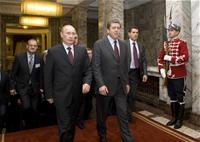 especially those that are close to the authorities, is understandable - the message is clear and unambiguous: a victory for Russia, Bulgaria is still under Russian influence. The problem of Bulgarian politicians is that they are pouring water into this propaganda mill - remember only the statements and the behaviour of President Gheorghi Parvanov in the last two years. Or the recent outpourings of Prime Minister Borissov that the Russians still remember the Bulgarian cognac and cigarettes, and must drink Bulgarian wines and mineral water. Emelyanova didn’t forget to also mention the puppy, which Putin took with him and which, according to Boyko Borissov would "grow big and very obedient to his new owner”. The puppy inspired Russian media so much that it was even celebrated in a song. Putin, himself announced a national contest for a new name, because he didn't like the name Yorgo.
especially those that are close to the authorities, is understandable - the message is clear and unambiguous: a victory for Russia, Bulgaria is still under Russian influence. The problem of Bulgarian politicians is that they are pouring water into this propaganda mill - remember only the statements and the behaviour of President Gheorghi Parvanov in the last two years. Or the recent outpourings of Prime Minister Borissov that the Russians still remember the Bulgarian cognac and cigarettes, and must drink Bulgarian wines and mineral water. Emelyanova didn’t forget to also mention the puppy, which Putin took with him and which, according to Boyko Borissov would "grow big and very obedient to his new owner”. The puppy inspired Russian media so much that it was even celebrated in a song. Putin, himself announced a national contest for a new name, because he didn't like the name Yorgo.
Undoubtedly, it is difficult for Sofia to obtain a new image before Moscow and to hold its positions with the necessary self-confidence. But, undoubtedly, this is vital. Moreover, Bulgaria is no longer alone - the country is a member of the European Union. And it has to behave properly - pragmatically, competently and confidently both in Moscow and Brussels.
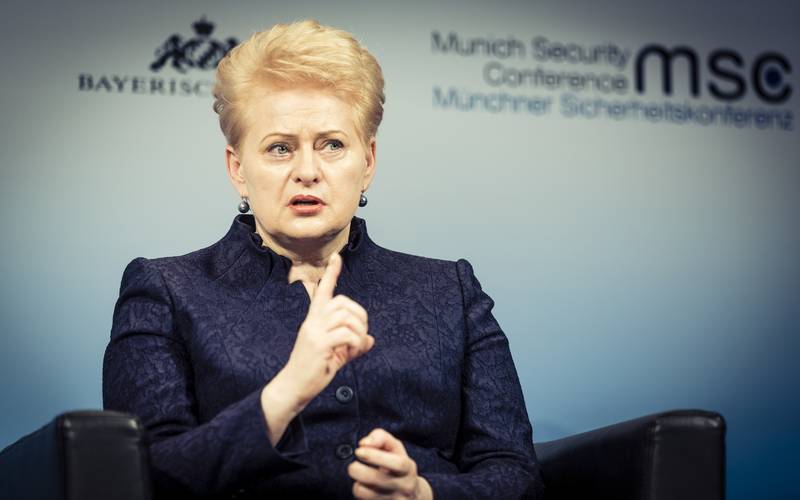 Dalia Grybauskaite | © MSC/Koerner
Dalia Grybauskaite | © MSC/Koerner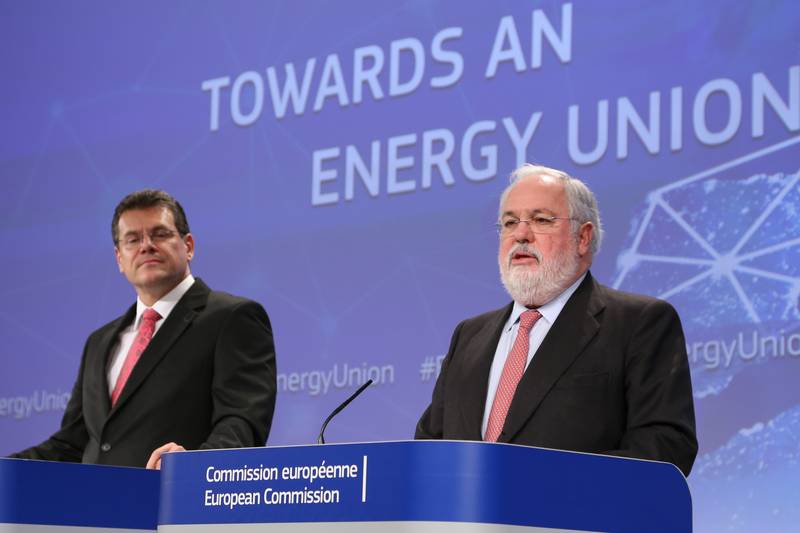 Maros Sefcovic, Miguel Arias Canete | © European Commission
Maros Sefcovic, Miguel Arias Canete | © European Commission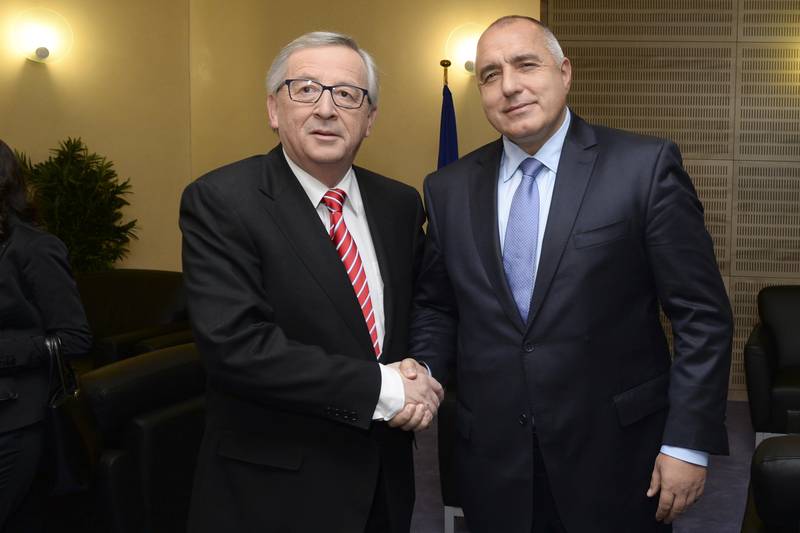 Jean-Claude Juncker, Boyko Borissov | © European Commission
Jean-Claude Juncker, Boyko Borissov | © European Commission